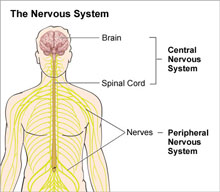What is a Neurosurgeon?
A neurosurgeon is a physician who specializes in the diagnosis and surgical treatment of disorders of the central and peripheral nervous system including congenital anomalies, trauma, tumors, vascular disorders, infections of the brain or spine, stroke, or degenerative diseases of the spine. The education and training to become a neurosurgeon is rigorous and extensive and includes the completion of:
-
Four years of pre-medical education at a college or university
-
Four years of medical school resulting in an M.D. or D.O. degree
-
One year internship in general surgery
-
Five to seven years in a neurosurgery residency program
-
Some neurosurgeons complete a fellowship after residency to specialize in a particular area
-
Continuing education — annual meetings, conferences, scientific journals, research — to keep up with advances made in the complex field of neurosurgery
The Central and Peripheral Nervous System
 The nervous system is a complex network of thread-like nerves and cells that carry messages to and from the brain and spinal cord to various parts of the body including the sensory organs, arms, hands, legs, and feet.
The nervous system is a complex network of thread-like nerves and cells that carry messages to and from the brain and spinal cord to various parts of the body including the sensory organs, arms, hands, legs, and feet.
Learn more about the central nervous system.
What Is A Neurologist?
Neurologists treat patients with complex disorders of the nervous system such as stroke, multiple sclerosis, Parkinson's disease, Alzheimer's disease, Lou Gehrig's disease, epilepsy, headache disorders, infections of the brain and peripheral nervous system. Neurologists often work closely with neurosurgeons, but do not perform surgery.
What Is Neuromedicine?
Neuromedicine describes a practice at Highland Hospital where neurosurgeons, neurologists, and other medical professionals work together to provide comprehensive inpatient care for patients with complex neurological disorders.